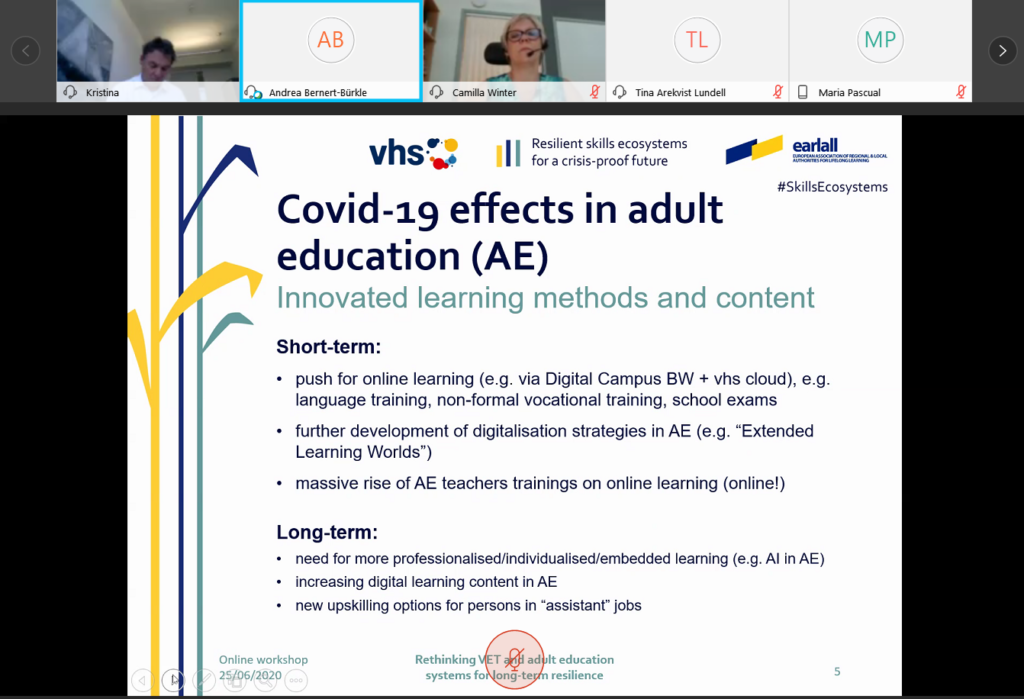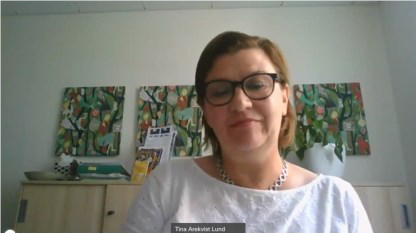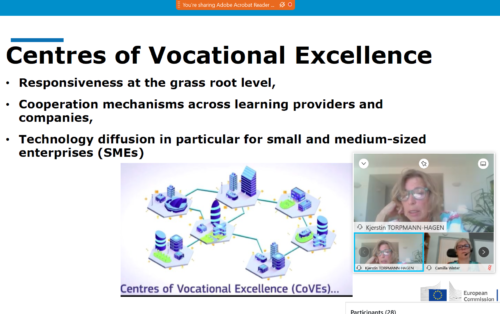EARLALL hosted online workshop on the future of VET and adult education
09/07/2020

EARLALL hosted a first online workshop for its Member Regions on 25 June 2020 on the topic of vocational education and training (VET) and adult education systems for a resilient future, under the Building Resilient Skills Ecosystems for a Crisis-proof Future initiative. The event gathered experts from the European Commission, Cedefop and regional and local authorities in order to share their perspectives about the future of VET and Adult Education and Learning (ALE). The goal of the workshop was to help to build strategies for resilience based on peer-learning, risk-assessment and crisis prevention mechanisms.
The event was chaired by Camilla Winter, on behalf of Region Västra Götaland, and began with three presentations by regional and local representatives of EARLALL Member Regions: Catalonia, Västra Götaland (represented by Borås Municipality) and Baden-Württemberg. Maria Pascual, Head of Unit of International and Cooperation Projects for VET at the Department of Education of the Government of Catalonia, introduced the main challenges faced by the region during the COVID-19 outbreak, as well as some solutions implemented, such as moving events and training courses to an online environment to keep spirits high among teachers and staff, and providing a personal support service for them.
Then, Tina Arekvist Lundell, Head of Adult Education Borås, explained how many measures implemented had meant an involuntary experiment from which lessons have been learnt, such as the improvement in participation rates in digital environments (keeping learning outcomes equal), while some challenges have also arised, such as inequalities due to the lack of Internet connection at home. Her presentation was followed by Rolf Ackermann, Referee at Baden-Württemberg’s Ministry of Culture, Youth and Sport, who showed how the investments made in the past by the region in digital platforms had proven to be essential in the outbreak of COVID-19. Nevertheless, the pandemic has also proven that improvements are needed, also in terms of digital skills. Lastly, Andrea Bernert-Bürkle, Head of EU Projects at vhs Baden-Württemberg, showcased how initiatives that had already begun in the past, like the BRIDGE+ project (co-funded by the Erasmus+ programme of the European Union), have proven to be more relevant than ever in the context of the pandemic.
- Maria Pascual, Head of Unit, Department of Education of the Government of Catalonia
- Tina Arekvist Lundell, Head of Adult Education Borås
- Kjerstin Torpmann-Hagen, Policy Officer at European Commission’s DG EMPL
Regional case presentations were followed by the views of the European Commission and Cedefop. Kjerstin Torpmann-Hagen, Policy Officer at European Commission’s DG EMPL (VET, Apprenticeships and Adult Learning Unit), introduced some of the Commission’s measures to support the VET and apprenticeships sector, including a survey launched in March to gather best practices. She also highlighted the value of the European Alliance for Apprenticeships (EAfA), the European Vocational Skills Week and the VET Excellence Awards. On another note, Antonio Ranieri, Head of Unit at Cedefop, presented the results of the Skills Forecast 2020, which are subject to great uncertainty in the short term due to the pandemic; nevertheless, many ideas remain valid, such as the trend towards a labour market polarisation between highly-skilled and lower-skilled workers, and the ageing of population. The solution to this challenges will be strongly linked to investing in reskilling and upskilling programmes for adults, as well as supporting a strong basic VET system.
Speakers agreed that some of the measures implemented had come to stay, and that a blended learning approach will characterise the way in which education and training systems will work in the years to come. A full report of the workshop has been made available by EARLALL, including the key points of each presentation, answers to some of the questions asked by participants during the event and links to best practices showcased.







